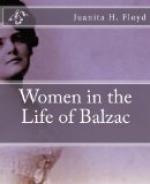I have said already that my aunt’s opinions consisted of a curious mixture of atheism and a profound belief in the Divinity. Her mind was far too vigorous and too deep to accept without discussion the dogmas of the Roman Catholic Church to which she belonged officially, and she formed her own ideas as to religion and the part it ought to play in human existence. She held the firm conviction that we must always try, at least, to do what is right, regardless of the sorrow this might entail upon us. In one of her letters to my mother, she says:
“You will know one day, my dear little sister, that what one cares the most to read over again in the book of life are those difficult pages of the past when, after a hard struggle, duty has remained the master of the battle field. It has buried its dead, and brushed aside all the reminders that were left of them, and God in his infinite mercy allows flowers and grasses to grow again on this bloody ground. Don’t think that by these flowers, I mean to say that one forgets. No, on the contrary, I am thinking of remembrance, the remembrance of the victory that has been won after so many sacrifices; I am thinking of all those voices of the conscience which come to soothe us, and to tell us that our Father in Heaven is satisfied with what we have done.”
A person who had intimately known both Balzac and my aunt said one day that they completed each other by the wide difference which existed in their opinions in regard to the two important subjects of religion and politics. The remark was profoundly true, because it was this very difference which allowed them to bring into their judgments an impartiality which we seldom meet with in our modern society. They mutually respected and admired each other, and even when they were not in perfect accord, or just because they were not in perfect accord as to this or that thing, they nevertheless tried, thanks to the respect which they entertained for each other, to look upon mankind, its actions, follies and mistakes, with kindness and indulgence. The curious thing in regard to their situation was that my aunt who had been born and reared in one of the most select and prejudiced of aristocratic circles, never knew what prejudice was, and remained until the last day of her life a staunch liberal, who could never bring herself to ostracize her neighbor, because he happened to think or to believe otherwise than she did herself. She was perfectly indifferent to advantages of birth, fortune or high rank, and she was rather inclined to criticize than to admire the particular society and world amidst which she moved. Balzac on the contrary, though a bourgeois by origin, cared only for those high spheres for which he had always longed since his early youth, and of which a sudden freak of fortune so unexpectedly had opened him the doors. In that sense he was the parvenu his enemies have accused him of being, and he often




